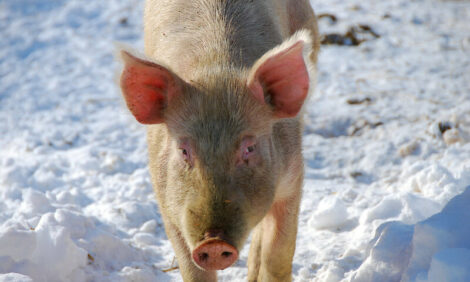



Weights Lower, Spot Prices Higher
UK - A slightly better day as far as sellers are concerned with the DAPP moving up a shade to 150.62p, pig weights and probes also dropping and Tulip’s stand on was followed by all of the other major players, writes Peter Crichton.The medal table reads as follows:
152p Woodhead
150p Gill
149p Tulip
147p Vion and Cranswick.


There was also more interest in pigs from spot bacon buyers who were anywhere between stand-on and +2p according to region and specification and reports of slightly better demand from fresh meat wholesalers with the prospect of two Olympic weeks ahead and the possibility of some reasonable weather and barbecue demand.
Spot bacon was generally traded between 150p and 152p and lighter baconers and cutters were also in slightly stronger demand at 4p–6p above this, although the sale of loins was still reported to be weak.
A very slight improvement in the value of the euro has also helped to redress some of the import/export balance with the euro trading on Friday at 78.68p compared with 77.80p a week ago.
Unfortunately a slightly weaker pound did nothing to help on the cull sow front where bids were generally back 1p–2p and most quotes were in the 108p–110p range with plenty of sows about with some herds being culled or numbers reduced to meet the challenge of soaring feed costs.
Although new crop barley has been traded at just under 3180/tonne off the combine, the futures market continues to paint an expensive picture with November LIFFE wheat at 3188/tonne and March 2013 at 3192/tonne.
The bulls are still rampaging through the soya market where a further decline in US crop conditions has done nothing to help pig farmers with prices in the region of 3435/tonne being quoted compared with below 3300/tonne this time last year when wheat was traded at 3153/tonne ex farm.
Weaner prices remain under pressure with the latest AHDB 30kg ex-farm weaner average quoted at 340.16/head and 7kg piglets changing hands in spot trades in the 326– 328/head range, which is not sustainable as far as producers are concerned.
Unless we see a reversal in the current trend more herds will inevitably be culled and those retailers who value the presence of British pork on their shelves may need to consider COP-related contracts if producers are going to survive.
If the price of oil goes up petrol costs more at the pumps… a pity this is not the case for pig meat.








